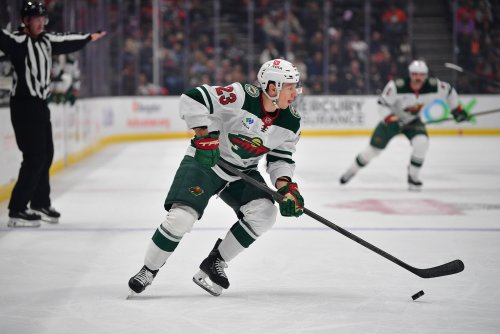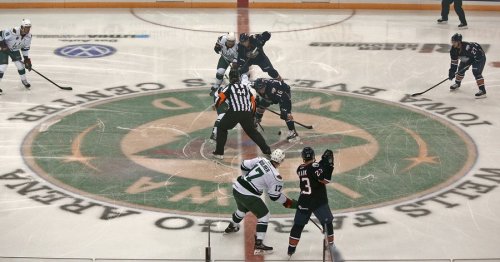
After a disappointing season, Matt Dumba’s inability to score at the rate he has the previous two years continued in the 2019-20 National Hockey League qualifying round. Overall, the Minnesota Wild employed their structured defensive plan against the Vancouver Canucks. The Wild just could not score. The same goes for Dumba. His defensive work was good, his lack of scoring was not.
Though most defenders in the NHL are not expected to score goals, many are leaned upon to drive offense and lead the charge out of their own zone. Not only is Dumba capable of playing sound defense, but he can skate and shoot the puck in a tremendous fashion.
Unfortunately, his talents did not help the Wild against the Canucks.
Dumba’s 2018-19 season was cut short due to tearing a pectoral muscle while fighting Calgary Flames forward Matthew Tkachuk. In the offseason, an allergy to the stitches post-surgery led to an infection that significantly jeopardized his physical recovery and compromised his ability to prepare for the 2019-20 season. It showed.
Unable to reach the scoring pace all year he had seen previously, towards the end of the season Dumba was getting back to his extraordinary self. Wild fans hoped that Dumba could get back to the player who could score 30-50 points from the blue line.
In fairness to Dumba, it was not for a lack of effort. Like points in the regular season, puck luck was not in his favor on the offensive side.
Play-In Performance
Dumba — like most of the defense and offense alike on the Wild — played fine defensively throughout the qualifying series against the Canucks. The following plays more than emphasize his elegance on the blue line:
Having said that, he did only register one takeaway and gave up the puck four times throughout the best-of-five series.
On the offensive side, Dumba missed several shot attempts, hit the post, and/or fired too high after finding lanes and openings between the pipes. In every game, he had opportunities to score but failed. But at least he was shooting.
Along with Kevin Fiala, Dumba led the Wild with nine shots on goal at 5-on-5 throughout the series. While playing alongside Jonas Brodin, Dumba was able to roam freely in the offensive zone with more space to work with as a result of Brodin’s elite playmaking ability and positioning. However, more was surely expected of Dumba than a mere assist in four games. His CF (Corsi For) percentage was impressive at 52.17%, as well as his FF (Fenwick For) at 57.83%. Again, as all Wild fans know, the lack of scoring was the team’s downfall against the Canucks. The defense overall did their job, which is to guard from the blue line to the crease, not be the sole offensive output.
Looking Ahead
According to Micheal Russo, Minnesota General Manager Bill Guerin is looking to draft a top center rather than explore acquiring one via trade or free agency. Now, nothing in hockey is impossible, on and off the ice. If the Wild are to trade for a top center, either Brodin or Dumba will most likely be part of the package.
In regards to Dumba’s play on the ice, if he comes into training camp healthy (which is currently projected to begin in November), without complications or injuries during his offseason workouts and skills training, he should play miles above his performance from this season. It should not surprise anyone to possibly see him bounce back to the range of 35-45 points as a defender. His effort, shot, and defense were all showcased toward the end of the season and in parts of the qualifying round, reminding everyone that the work and skill to pick up those points is there, just not clicking in the right way.
Finally, his nomination for the King Clancy Memorial Trophy can not be overlooked in this report card. When his nomination was announced, our own Ryan Quigley put together the incredible list of work Dumba has done off the ice:
Playoff entry or not, Wild fans can feel pride and hope for the future that one of their team is fighting for something much more important than just a championship. He is laying the groundwork to improve the sport to be more inclusive for all, and the local community around that team as well. Dumba’s on-ice production in the playoffs might not have been ideal, but his actions outside the game — kneeling, raising his fist, his moving speech, calling for an end to the violence and hate — shine brighter than the polish on the Stanley Cup. His playoff performance on the blue line might not be inspiring anyone to put on the skates this offseason, but fans should absolutely look to him as a leader and a role model for community engagement and civic responsibility as society does the work to dismantle systemic, structured racism and the targeted oppression of minorities.
Dumba recently spoke with Micheal Russo and stated, “If I got a chance to dream, I think in 10 years, I think you’ll see at least half of the team is going to be mixed or have some color or be some minorities, or maybe at that time it’s the majority. ...I can only see our game growing to new heights, new levels and hopefully by that time, kids will only hear the stories; the stories of what some of us had to go through to get where we are.”
And someday, stories will be told of Matt Dumba, the first NHL player to kneel during the national anthems.
Previously in the Minnesota Wild play-in report card series:
Think you could write a story like this? Hockey Wilderness wants you to develop your voice, find an audience, and we'll pay you to do it. Just fill out this form.









Recommended Comments
There are no comments to display.
Join the conversation
You can post now and register later. If you have an account, sign in now to post with your account.
Note: Your post will require moderator approval before it will be visible.